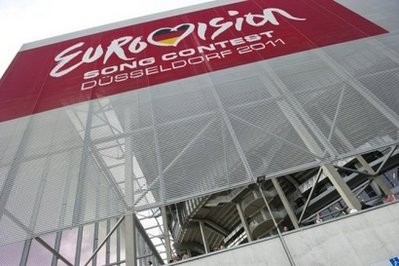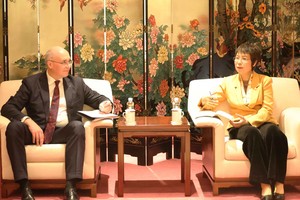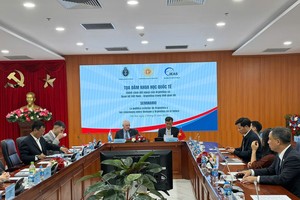Europe has few reasons for cheer at the moment, but tens of millions of people across the continent and beyond will Saturday let their hair down for the pop extravaganza that is the Eurovision Song Contest.
Often cringeworthy but always watchable, Europeans have for decades been putting their feet up in front of the TV to watch Eurovision, through thick and thin, good time and bad.
The 56th edition in the German city of Duesseldorf is no exception.
"It's amazing. This competition brings Europe together and brings countries together. This is what I went into music for, bringing people together," said Lee Ryan, 27, a member of this year's British entry, newly reformed boy band Blue.
"It's a big holiday, a big holiday for everyone in Europe, with such great singers and beautiful songs. The Eurovision is unique," Ukraine's entry Mika Newton, 25, hoping for her country's second victory, told AFP.

Europe's favourite TV show, and one of the longest-running, is now broadcast not only in Europe, but also in Australia, Canada, Egypt, Hong Kong, India, Jordan, Korea, New Zealand and the United States, even though they do not participate.
Forty-three countries entered this year, and these were whittled down to 25 in a series of qualifying rounds for the grand final.
Germany, France, Britain, Spain and Italy automatically qualify, not because their songs are always better -- Britain came last in 2010 -- but because they pay the lion's share of the costs.
Viewers at home and juries from each of the countries then vote on each song, ranking them from their favourite, which gets a full 12 points, to the biggest howler, which gets zero.
The results are also announced in French, something that has made "douze points" and "nul points" well-known catchphrases in their own right. Ireland's song in 2008, sung by the shouting-and-farting Dustin the Turkey, was "Irelande Douze Pointe".
The winner, announced at around midnight (2200 GMT), gets to host the competition the following year, which is why the 2011 contest is in Germany.
This can lead to problems, however, as when in 1998 Israeli transsexual Dana International won, riling the country's ultra-Orthodox community, who then had to contend with the 1999 contest taking place in the holy city of Jerusalem.
Despite Europe's linguistic diversity, most perform in English, and songs in the language of Shakespeare have won 22 times. French songs have won 14 times, Dutch and Hebrew songs three times each. Norway's 2011 entry is partly in Swahili.
This year, the song tipped as favourite is in Corsican -- for only the second time in Eurovision history -- with Amaury Vassili, 21, hoping to win France's first victory in more than 30 years.
"The language is very close to Italian," the tenor told AFP. "There is the same fluidity for singing. And it has a romantic side that is very like Italian."
But he faces some tough competition from among the other 24 nations contesting Saturday evening's competition from 9:00 pm (1900 GMT), not least from spiky-haired Irish twins Jedward and their song "Lipstick".
Bookmakers also give Azerbaijan's duo of Ell and Nikki a fighting chance of winning the country's first title, along with Britain's Blue and Estonia's Getter Jaani, a winner of the "Estonia's Got Talent" TV show.
A ska number from Zdob si Zbub, a group of lively Moldovans in pointy hats -- they say they are "cosmic antennae" -- is also a strong contender, as are songs by Icelandic five-piece Sjonni's Friends and from Italian crooner Raphael Gualazzi.
But Germany's homegrown Lena could write history as the 19-year-old tries to become the first ever person to win two Eurovisions in a row, although "Taken by a Stranger" lacks the quirky catchiness of 2010's "Satellite."
"This whole thing here is not serious. It's happy, you know. I think we have to enjoy it," Lena said.
"Maybe the rest of the world can watch it and do something like we do, can do a Worldvision. All countries just having fun," said Lena.
























